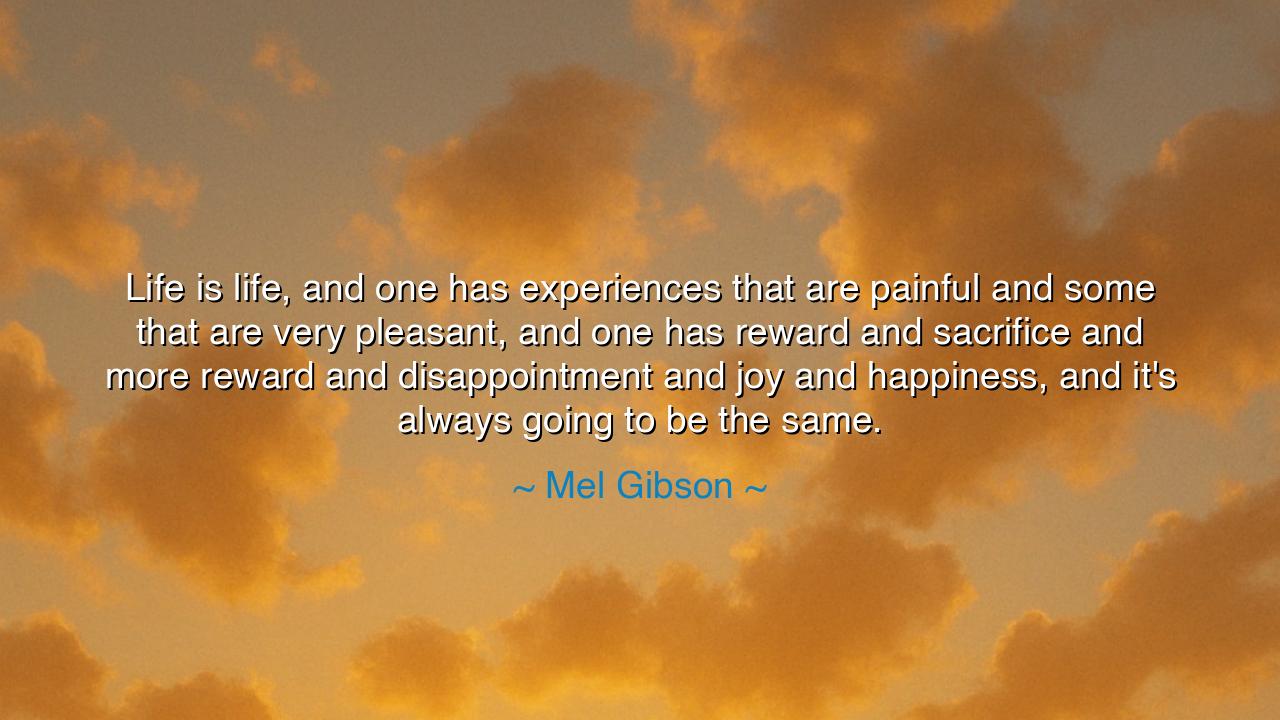
Life is life, and one has experiences that are painful and some
Life is life, and one has experiences that are painful and some that are very pleasant, and one has reward and sacrifice and more reward and disappointment and joy and happiness, and it's always going to be the same.






The words of Mel Gibson—“Life is life, and one has experiences that are painful and some that are very pleasant, and one has reward and sacrifice and more reward and disappointment and joy and happiness, and it's always going to be the same”—speak with the ancient cadence of acceptance, the wisdom that comes from one who has wrestled with the tides of existence and has learned that the sea itself does not change. Beneath their simple rhythm lies a timeless truth: that life, in all its beauty and cruelty, does not bend to our desires, but moves in cycles that every soul must endure. Gibson’s words are not those of despair, but of recognition—of peace born from understanding that no man escapes the eternal dance of joy and sorrow, gain and loss, hope and heartbreak.
In the ancient world, this truth was regarded as sacred law. The philosophers of Greece spoke of the Wheel of Fortune, turning endlessly between triumph and tragedy. The Stoics, like Marcus Aurelius and Epictetus, taught that peace is found not in changing life’s nature, but in accepting it. “Do not expect figs in winter,” they said, “for nature does not obey your will.” Gibson’s words echo this same wisdom. He reminds us that the essence of life—its pleasure and pain, its reward and disappointment—remains unaltered across generations. Empires rise, technologies evolve, but the human heart still breaks and rejoices as it did in the dawn of time.
This is not resignation—it is awakening. To say that “life is life” is to strip away illusion. It is to see existence in its true form: not as a puzzle to be solved, but as a river to be navigated. The one who demands that the river stop flowing so he may rest will drown; but the one who learns to move with its current will find freedom even in the storm. The ancients understood this when they spoke of ataraxia—the serenity of the soul untouched by the chaos of fate. Gibson’s reflection carries the same spirit: the calm born from knowing that both suffering and delight are temporary guests, passing through the house of being.
Consider the story of Job, that ancient man of the East, whose life was both blessed and broken. In his prosperity, he rejoiced; in his ruin, he wept; yet through all, he came to understand that the nature of life is not cruelty, but change. “The Lord gave, and the Lord hath taken away,” he said, “blessed be the name of the Lord.” His words are the echo of Gibson’s: that reward and sacrifice, joy and disappointment, are not contradictions, but companions. The man who accepts this truth is unshaken by fortune, for he knows that both light and shadow are the language of life.
Mel Gibson, like many who have faced both praise and persecution, speaks not from theory but from the lived experience of extremes. He has tasted success and failure, love and loss, and found in them the same eternal pattern. In his reflection lies humility—the recognition that no man is exempt from the laws of existence. The sun that rises for kings also sets upon them; the same waves that carried heroes to victory have also swallowed their ships. Life, as he says, “is always going to be the same,” not because it is cruel, but because it is complete. It holds within it the full spectrum of human experience, and through that totality, it teaches the soul endurance and grace.
There is a kind of freedom in this understanding. For when one accepts that joy and pain are woven from the same cloth, one ceases to cling to either. The heart learns to rejoice without arrogance, to mourn without despair. To live wisely is to walk the middle path—to take pleasure without possession, to bear sorrow without surrender. The ancients would say: “The wise man does not curse the storm, nor does he worship the calm; he simply sails.” And so, Gibson’s words become not merely reflection, but instruction—to see all that comes as part of the great and unchanging rhythm of life.
So, dear listener, let this be your lesson: cease your striving to make life only pleasant, for such a world would be lifeless. Instead, embrace the wholeness of existence—the sorrow that deepens compassion, the joy that awakens gratitude, the struggle that gives birth to strength. Do not seek to escape the wheel; learn to move with it. When pain comes, let it pass through you; when joy comes, let it fill you. But hold to neither, for both belong to time.
Thus, the wisdom of Mel Gibson joins the eternal chorus of sages and poets before him: that the shape of life does not change, only our understanding of it does. To live fully is not to resist the storm, but to dance in its rain, knowing that after thunder comes silence, and after silence, the dawn. Life will always be the same—but the soul that accepts this truth will find, within the sameness, an infinite peace.






AAdministratorAdministrator
Welcome, honored guests. Please leave a comment, we will respond soon